Stranglers - Interview with JJ Burnel
by Denzil Watson
published: 12 / 4 / 2015
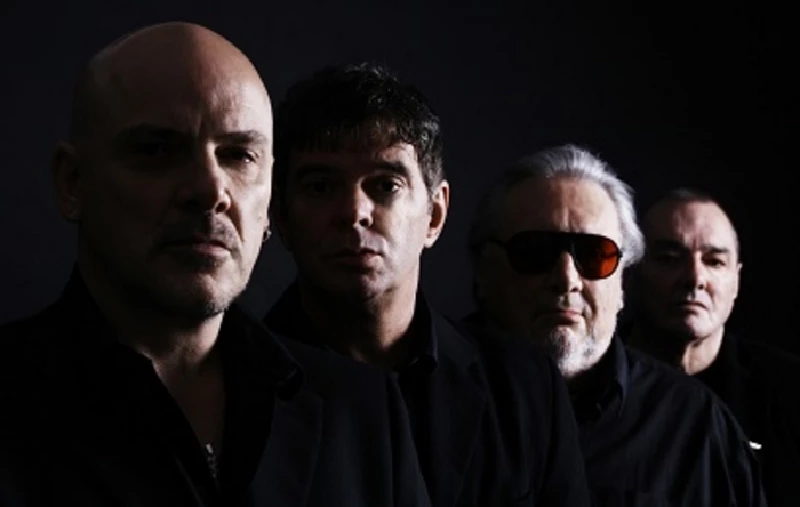
intro
Denzil Watson talks to legendary Stranglers bassist Jean-Jacques Burnel about his band's colourful career, their forty year history and plans for their forthcoming UK tour
Few bands can boast such a long and successful life as the Stranglers. Fewer still can match such a colourful career as the band that started life on the Guildford pub-rock circuit in the mid-70s. Pigeon-holed with the emerging punk rock scene, the Stranglers were always too idiosyncratic and multi-textured to be shoe-horned into a single genre; a factor that undoubtedly goes a long way to explaining their longevity. Having survived the loss of their ironic lead-singer Hugh Cornwall back in 1990, the band still features the remaining three other original members (Jean-Jacques Burnel - bass, Dave Greenfield - keyboards and Jet Black - drums) along with co-frontman/guitarist Baz Warne. Last year the band celebrated their Ruby anniversary by promoting their recent album ‘Giants’ with one of the most successful tours in the whole of the UK. With their star still very much in the ascendency, Pennyblackmusic caught up with their legendary bassist JJ Burnel prior to their next UK tour in March. PB: Last year was your Ruby celebrations and it turned out to be a special year, didn't it? JJB: The last couple of years have been pretty full on. The summer before we were the first band to do the Proms at the Albert Hall and that led up to last year. So. the last two years we did Australia, New Zealand, the US, Europe and it was full on until the summer. And then in the summer we did all the major festivals. So yeah, it's been quite special for us. When we started out as young men in a band, you expect it to last two or three years and have a bit of fun and then that's it. PB: The whole of the Ruby Tour in the UK sold out, didn't it? JJB: It did. It was the most successful British tour last year, I think. PB: So leading on from that is the question of how you are going to follow that with March’s 19-date UK tour? JJB: Ha ha, well more of the same! Although we're actually dipping into material that we haven't played for over 30 years just to mix it up and show another side of the Stranglers. After all, we've seventeen albums-worth of material to choose from. Why should we always play the same stuff? We're not selling anything, just selling a good time, I hope. There aren't any albums to promote, so it's just a laugh. No commercial imperatives. PB: Which gives you quite a bit of artistic room to manoeuvre in, right? JJB: Of course, completely. We've always had that. We were one of the first bands to have contracts that allowed us artistic control. We could choose what was going to be on an album to the extent that when the record company had written us off and said “Oh, punk is dead,” and then we said "We'd really like to release this thing [Golden Brown] as we really rate this song," and they said "Oh no, it's not very punky, no one can dance to it," but we insisted so they had to release it. So, they thought they would release it just before Christmas along with the avalanche of releases they used to do in those days, and despite the record company it was a success world-wide. So, we've always had that artistic control which didn't exist for a lot of people. PB: You've got a lot of songs that you can draw on for your live sets. Any surprises in the set for March's tour? JJB: There are some songs that I'm currently trying to re-learn from thirty years ago. PB: Any real surprises in there or do you want to keep them under raps? JJB: Yeah, I think there are a few (Laughs), but then it wouldn't be a surprise if I told you. PB: And you've also got a lot of B sides that you could draw on as you didn't really do throw-away B sides, did you? JJB: We used B sides to do really experimental tracks without any commercial imperative whatsoever. It was really an opportunity to try new things. And we've thrived on that as a band. Trying different approaches, different song-writing techniques and different instrumentation. We've been very lucky compared to a lot of bands who stuck to a winning formula. They were successful with one thing, so they tried to replicate it. Perversely we tried the opposite because life's too short to stick in a little rut. And when we're dead and buried hopefully we'll not be forgotten because they'll be quite a diversity of material to listen to. And also the subjects we talk about will represent the period we lived in. PB: A lot of those topics also come back round. Like for instance some of the tracks on ‘The Raven’ such as 'Shah-Shah-A-Go-Go' which is about Iran. JJB: Well, yeah. On a few occasions we hit the nail on the head. We've represented the zeitgeist. And the more smartly observed might take note of that and that's why we have more respect than before, I think. PB: A question that a lot of our fans are going to be asking is whether Jet will make an appearance behind the kit this tour. JJB: Well we're hoping so. Last year he faltered a bit and he has been faltering a bit for the last few years. He started out doing a twenty-minute set and he needed oxygen at the end of it, and he ended up not doing quite a few of the shows. When he was strong enough to do just one or two songs we were grateful to see him. He's mentoring Jim [MacAulay] the drummer who replaced him, who is great. Over the years, since the beginning we've had about seven drummers for when Jet has been poorly. He's 76, for Christ-sake. He's not going to get any better, and being a drummer is very physical. In the studio it's a very different thing. You've got time to rest and focus on the thing. But a live gig with the sweat and the heat...it's really become even more of a problem than it was before. PB: Talking of the studio, you must have been very pleased with the way your last album, 'Giants', was received. JJB: Yeah. Funnily enough, for a bunch of old farts, it was our best-received album ever, world-wide. So you think, "Fuck me, life in the odd dogs still yet." PB: Sonically it was a return to the Stranglers sound of yore with the big bass and Dave Greenfield's keyboard runs, wasn’t it? JJB: Yeah, I think so and also in terms of the subject involved and how the songs developed. It turned out to be much more in that vein, if you want. PB: What do you put that down to? Was it the way you recorded it, the song-writing process or just the personnel in the band? JJB: Well, it's a combination of all those things really. It's like any band or any team. It just takes one person to change things and the dynamic and the psychology between the different members of the band. We also made the point of spending hardly any time in the studio learning the pieces, developing them as a band in a room, looking at each other discussing them, amending stuff and knowing them so well we hardly needed to look at our instruments, which actually relaxes you. It means that rather than being a machine you can interpret it as a human being. The art is to convey that onto the recording medium, which I think we succeeded quite well in doing as that's what we used to do in the old days. Then you start to spend more and more time in the studio and it starts to get sterilised a bit. And people can hear it. They can tell the difference. Certainly people who have never heard a recording done almost nearly live, suddenly when they hear something like that it's a bit of a shock to them as there's a whole generation of people who haven't heard music done like that. PB: There were six years between 'Suite XVI' and 'Giants' – will there be a follow-up and if so will we have to wait as long for the follow-up to 'Giants'? JJB: Yeah, well that's why we've curtailed our live activities to concentrate more on collecting our thoughts. I've got a hundred and twenty-five little ideas and riffs and stuff, so I just need to make sense of them at some time. Just sit down and develop them and think, "What the fuck was I on when I wrote that?" PB: You mentioned you've done seventeen studio albums, had over twenty Top 40 singles and have got as bigger fan base as you've ever had. What is it about the Stranglers that has made the band have such staying power and longevity? If you look at all the other punk bands, there's probably only the Damned who've stayed the course along with yourselves. JJB: I quite like the Damned actually. One of their albums, 'Machine Gun Etiquette', is probably my favourite album from that period. You know these days everyone is a bit cynical and career-orientated, and it's a bit show-bizzy and a bit phoney. I think those people who react against ‘The X-Factor’ generation appreciate something that is relatively bullshit-free. We've made all the wrong commercial moves and made mistakes over the years, and I think a certain number of people respect that. People who come to see the Stranglers, I think, respect that, and there are tunes that have lasted and some of the stuff has dated but an awful lot hasn't. We can still hold our own and we're not hiding behind anything. There are people who have grown up with us, people who have joined us mid-way and a number of youngsters who think we have got credibility. And live we sound great and there's an energy there and people get off on it. And there's a sort of community. Being at a live gig, there's nothing like it. It's a form of communion. PB: It's not just a gig, is it? It's an event. JJB: Yes, definitely. Well, it should be. It shouldn't just be, "Well, entertain us". PB: I read Hugh Cornwell's biography, 'A Multitude of Sins'. He said that he left the band after the Alexandera Palace gig in 1990 because he thought you were a spent force. JJB: I think he was probably right. We were kind of going through the motions and kind of a bit lost because my relationship with him at that time had just gone down the drain. PB: What caused that to happen? Lack of communication? JJB: Well, lack of communication because of other things. Success can corrupt and we were all successful and made money, and Hugh was suddenly appearing in ‘Cosmopolitan’ magazine, and showing off different jumpers and clothes and getting his own stylist, and they were telling him what to wear. And then he was starting to appear in cameo parts with the Saturday night people. He got a theatre agent, and all this was distracting from what a band should be. And this [gang mentality] was being lost. I'd really looked up to him and he'd been my mentor and best friend, and he was a bit older than me so I learnt a lot from him. But success came by, and he started going out with models and going to New York for the weekend with his model girlfriend, and it was just not what we were about. PB: Have you spoken to him since he quit the band after the Ally Pally gig? JJB: Maybe twice when I tried phoning him and said, "Look, let's go out and have a drink." And he just said, "I think we should maintain the status quo" and put the phone down on me, so I understand. It's hurtful but you've got to move on and not be bitter about it anymore. I was really hurt when he left, but, you know, the band’s even better now. PB: Well, I've seen you a number of times over the years and I have to say this is the best I've seen you over the years. JJB: Well, that's what everyone says. And it feels that way as a member of the band, to be honest. And that's why people are coming to see us I think. 'Giants' was the best-received album we've ever had since the beginning. PB: For me the key moment was when Baz Warne stepped-up from just playing guitar to becoming the band's front-man around 2006. There are few bands that have replaced an iconic frontman like Hugh undoubtedly was, and gone on to prosper like the Stranglers have. You've really flourished under Baz. He sounds like Hugh Cornwell while not really trying to sound like him. JJB: I think you must be right because you can't force people to come and see you and to commune with you. An awful lot of people who had grown up with us had gone and left us, and came back when we became a four-piece again. Then there's a whole new audience of younger people who think we are cool, and you can't con them. We're not getting huge pushes in the media, so it's word of mouth and it's what people feel. So it's genuine. PB: Just looking ahead, there will come a point when Jet Black retires from the band. Have you thought about what you will do then? JJB: No idea. And I don't really want to think about it. I'm enjoying myself so much, and also the people we are playing to seem to be getting off on it. If it affects me and it affects the song writing, of course, then we'll call it a day. Who knows? Jet wants us to carry on even if he can't even give an opinion, but hopefully even in the studio he will be able to influence things. Another thing I've noticed about the Stranglers compared to a lot of other bands that are our contemporaries is that they make game plans and career plans and that would affect their spontaneity or lack of it in situations. "Oh, no, don't do that. It might affect our career". PB: When you look back at what you have done you have achieved so much with the band over the years. Is there something that you are still burning to achieve? Are there, for example, some countries you'd like to take the band to and tour? JJB: I'd like to play in South America. We've got a bit of a following there, and there have been a few abortive attempts to get some gigs there. PBM: Our local boys Arctic Monkeys are quite big there. JJB: And so they should be. They deserve to be big everywhere as they are a really good band. But they shouldn't try to be tough guys at awards! PB: While were on about tough guys, a thing that I saw on YouTube that amused me was some bloke who chucked a pint on you while you were on stage in Liverpool. I thought, "What a fool you are - you're throwing a pint at somebody who's just got their 7th dan black belt at karate.” JJB: He was a prick! I didn't feel justified in punching his lights out so I just slapped him. I think it had more effect bitch-slapping the guy than taking him out. It was a silly thing to do. I mean (A) you shouldn't do that to any of the Stranglers because we do our own security and (B) it's kind of disrespectful because you get it on your strings. We're radio miked up so we're not going to get electrocuted. but it fucks your strings up. He didn't own-up but everyone around him was pointing at him, so I just grabbed him over and told him what was what. PB: I guess beer is better than spit because in the early days of punk there was a lot of spitting, wasn't there? JJB: Except for the fact that we put a stop to it early on. A lot of the other bands got it. I think a couple of guys, Joe Strummer notably, got Hepatitis and got an infection from some spit. We put a stop to it very quickly whenever we saw someone do it. One time we caught some one doing it so we dragged them on stage, took his trousers off and stuck a banana up his arse. Unfortunately the same thing happened in New York that same year and there weren't any bananas back stage, but there was a celery stick! PB: Looking back you did have the reputation of being a bit of a wild child back in the 70s, didn't you? JJB: Well, we were fighting our corner. We were getting so much vilification from the press because the press were so polarised and decided the Sex Pistols were cool and we weren't, so we were getting so much stick, whether it was from the media or the people who thought they were going to bring us down a peg or two. And we'd already been forged in fire because every night, at one point, people were looking to take us out. So, we weren't strangers to that kind of thing. And we knew how to hold our own. PB: I think one of the most well-documented incidents was when you smacked Jon Savage, wasn't it? JJB: Well, I let him have a couple of swings at me first to be honest because I chucked a glass of Coca Cola in his face and told him what I thought of him. And he swung a punch at me, and that was my excuse. Fair game, but then all the bouncers grabbed hold of me and chucked me out and he's had it in for me ever since. PB: Did you catch the ‘Punk Britannia’ series on the BBC? JJB: Yeah, and we've been written out of history. PB: It was a series of programmes and I kept thinking, "OK, any minute the Stranglers are going to come in here," but you didn't. JJB: I think they played one of our tracks on it, but we'd been written out and all of the histories that he's been consulted on it's been the same. But people know this. PB: Do you think the band have received the credit they deserve? JJB: Well we're starting to get it when we're in the autumn of our careers. We're starting to get worldwide recognition. It's kind of much more subversive than that but not a bad thing. And people know it. Hype is like that English expression "You can take a horse to water, but you can't make it drink." People are 'hype-sensitive' these days. They are smarter people, so they know when something is bullshit and when it's not. Word-of-mouth is still the best and most effective way of crediblising people, isn't it? They are coming to our shows when all those other shows have been going downhill with the recession on. I think there's a reaction against ‘The X-Factor’ thing too. All those things combined I think people have been grateful towards something that's real. PB: The other thing that stands out with your tours is that you always seem to pick good supporting acts. I'm thinking of the likes of Wilko Johnson, Nine Below Zero, the Godfathers and on the forth-coming tour in March, Scottish new-wavers, the Rezillos. JJB: Well, there are some good bands there and, well, thanks. It's completely arbitrary but we try to make an evening of it. I remember seeing an interview with the Who’s Pete Townshend years ago, and he said, "The support act, I had him taken off after three shows and his name was Jimi Hendrix. I don't want this guy supporting us any more!" PB: A few 'obvious' questions now. What is your favourite album out of the seventeen so far? JJB: I've got three really. 'The Raven' I think is complete. Everything on it is how it should be. You normally do an album and think "I could have done that better." 'Men in Black' because that tells a story, and 'Giants' because it is a return to what we should be doing. PB: Okay, this is a harder question. What is your favourite Stranglers’ song? JJB: That's a cruel question. I'm sorry. I refuse to answer that one! PB: Okay, let's try this instead. Which Stranglers’ song's bass line are you most proud of? JJB: ‘Baroque Bordello’? Or ‘Peaches’? You play those first three notes and people know what it is. PB: You're now seen by many as an inspirational and iconic bass player. Who has inspired you? JJB: There are three bass players of note who have inspired me. John Entwistle in the Who and 'My Generation’, that bass line. I thought that was bloody cool. And Jack Bruce of Cream was cool as well. And Noel Redding from the Jimi Hendrix Experience’s riff on 'Hey Joe', which I nicked years later. PB: I don't know if you've read Peter Hook's recent biography but he cited you as a major influence on his bass playing. JJB: Yeah - he's been one of the most honest people. He's said that a few times when a lot of people were afraid to say anything about the Stranglers. He's always been consistent. PB: Okay one last question...coming right up-to-date. After the attacks against the ‘Charlie Hebdo’ offices you asked your web guy to post "Je suis Charlie" on your website and social media sites. You've obviously got strong links to France and are in France right now. What do you make of all this and how France has reacted to it? JJB: Well, it's interesting. I think they have reacted as they should do. There are 5 million Muslims in France. Most of them get on with their lives. But it is a fear for French people that they might be harbouring people who don't like France. So that's the big job; to try and have harmony amongst all of the different religions and integration. I think integration is probably the most important thing. You can still have your own religion but you are in a country and it's not a Muslim country but there are Muslims there. They are worried it could kick off. PB: It's really interesting that the French press has reacted as they have because the English press have really self-censored themselves. ‘Charlie Hebdo’ went straight back out with a cartoon depicting the Prophet Mohammed, while the English press wouldn't even reproduce the front cover. JJB: Interesting, yes. But I think the French see it as an absolute attack on the fundamentals of the Republic. They've banned the burqa in France. You can do whatever you want in the privacy of your own home, but in public your face mustn't be completely hidden. Now would we do that in the UK? PB: Good point. Probably not. I think the authorities would be scared to take that step. JJB: Would it be seen as provocative or something that is commonsensical? PB: I think it would be seen as denying people the right of self-expression and to be able to dress how they like. JJB: I think that's how they would excuse it. I can see things on both sides. It is provocative to depict the Prophet Mohammed when you see what it has provoked already, but I don't think they should be cowed and be afraid to repeat the same provocative act. It's their right. It should be the right of the media to be honest. It's a debate though. PB: I suppose at the end of the day you allow yourself as an individual to be offended, don't you? JJB: Yes, I agree completely. I remember when there was shock horror at the Stranglers, and I thought well these people deserved to be shocked. If something silly and childish is shocking someone else, then they deserved to be shocked. I think they want to be shocked. And that shows a weakness, I think. PB: But like you say it does provoke thought and debate which is a good thing. JJB: Yes, it's definitely a good thing. PB: Thank you
Band Links:-
http://www.thestranglers.nethttps://www.facebook.com/thestranglers
https://twitter.com/stranglerssite
http://www.stranglers.org.uk/index.htm
http://en.wikipedia.org/wiki/The_Stranglers
http://downinthesewer.com/
Picture Gallery:-
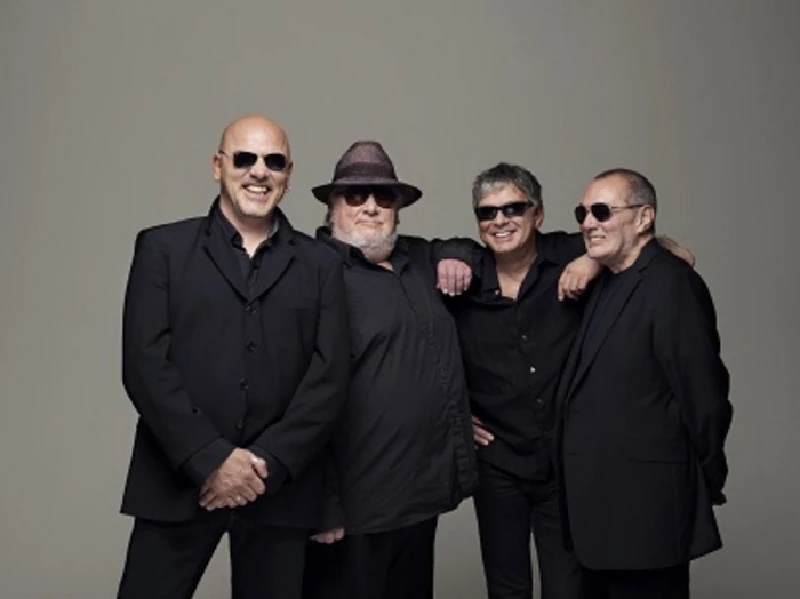
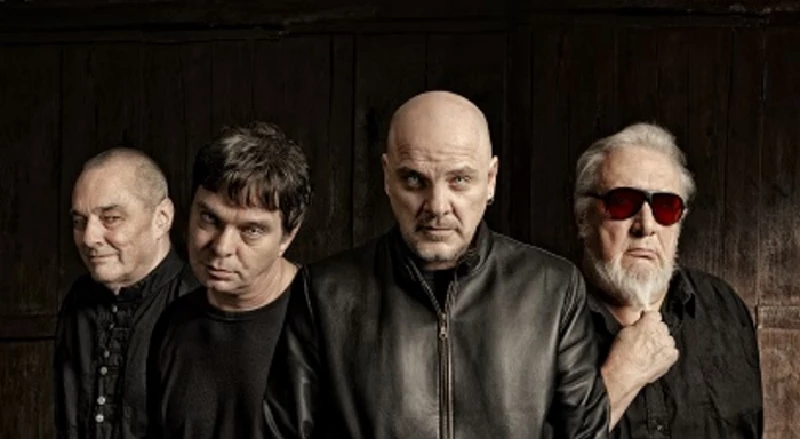
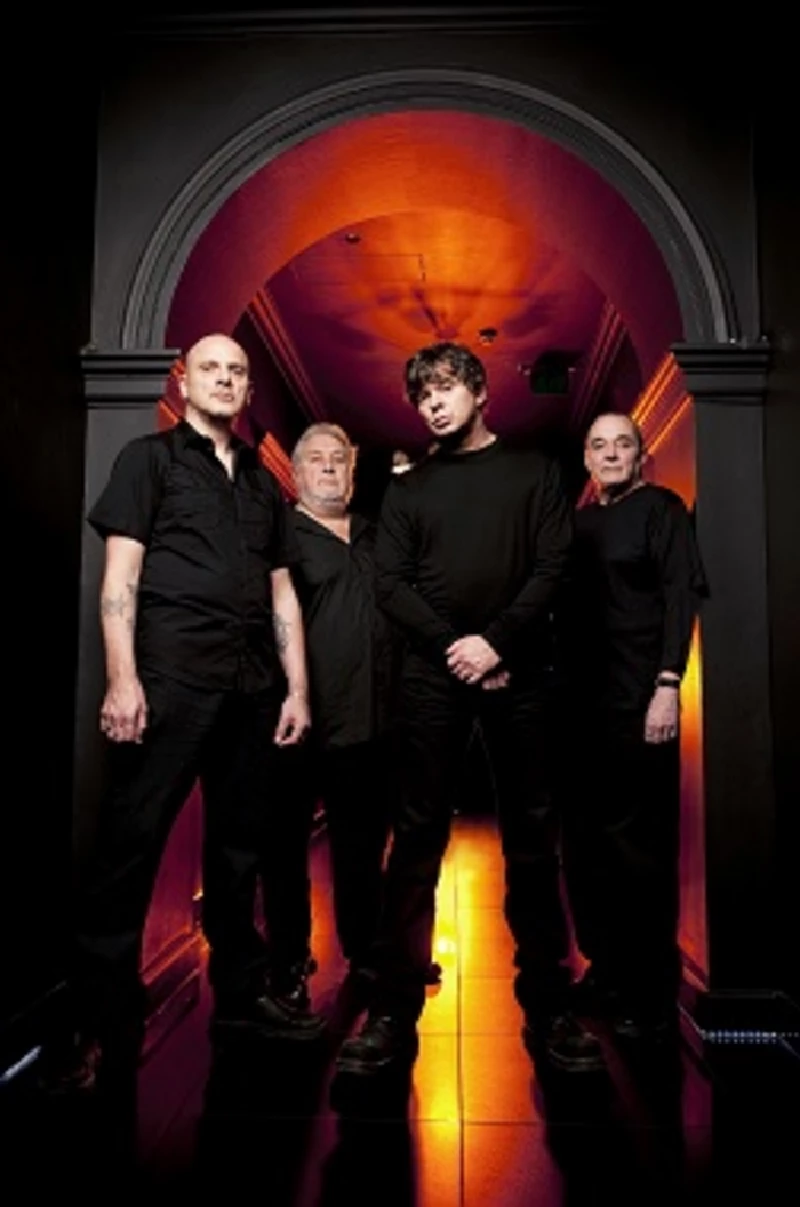
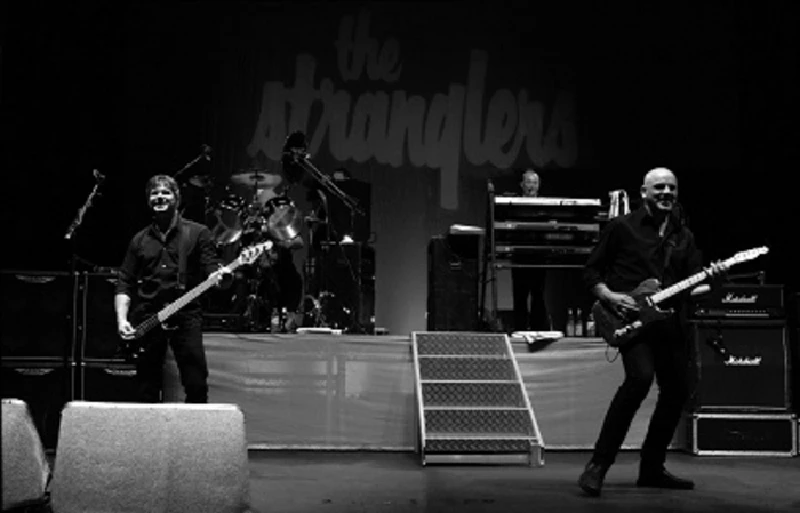
Visitor Comments:- |
| 736 Posted By: ratking, manchester on 14 Feb 2015 |
|
great' great' interview'on only thing i didn't agree with is about Giants' I don't like this album.
Nofolk coast' is class' Suite X1V is superb'just did not get Giants at all.
once again great interview.
|
interviews |
|
Interview with Jean-Jacques Burnel (2019) |
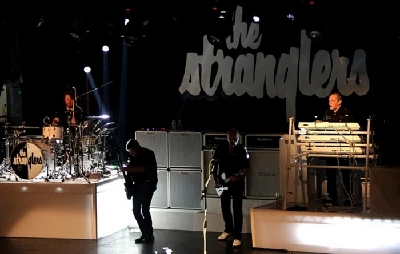
|
| Denzil Watson caught up with legendary bassist and founder member of The Stranglers, Jean-Jacques Burnel, to chat about their current tour, the increasing possibility of a new Stranglers album and the invention of a new word. |
| Interview (2018) |
| Interview (2017) |
| Interview (2016) |
| Interview with Jean-Jacques Burnel (2015) |
| Interview with Baz Warne (2013) |
live reviews |
|
Rock City, Nottingham, 23/3/2022 |
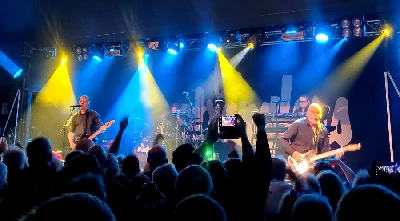
|
| Following the loss of founder member, keyboardist Dave Greenfield and Covid related rescheduling, punk legends The Stranglers make a blazing return to the stage in Nottingham. Denzil Watson reviews. |
| 02 Apollo, Manchester, 30/3/2019 |
| (With Therapy?), 02 Academy, Liverpool, 6/3/2018 |
| Rock City, Nottingham, 13/3/2017 |
| Boardwalk, Sheffield, 16/10/2004 |
| Leadmill, Sheffield, 7/3/2004 |
favourite album |
|
Black and White (2011) |
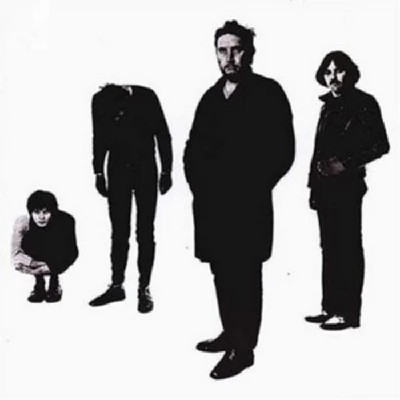
|
| In our 'Re: View' series, in which our writers examine albums from the past,Denzil Watson reflects upon the Stranglers' 1978 third album, 'Black and White' |
photography |
|
Photoscapes (2016) |
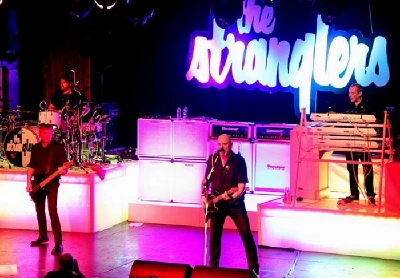
|
| Denzil Watson photographs the Stranglers at a show at the Sheffield Academy on their latest tour in which they performed their seminal 'Black and White' album in its entirety |
reviews |
|
Giants (2012) |
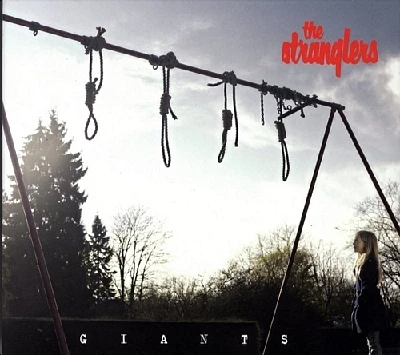
|
| Faltering seventeenth album from the Stranglers, which, after an excellent opening, starts to stagnate badly |
most viewed articles
current edition
Carl Ewens - David Bowie 1964 to 1982 On Track: Every Album, Every SongArmory Show - Interview with Richard Jobson
John McKay - Interview
Colin Blunstone - Thalia Hall, Chicago, 16/7/2025
Billie Eilish - O2 Arena, London, 10/7/2025
Bathers - Photoscapes 1
Visor Fest - Valencia, Spain, 26/9/2025...27/9/2025
Loft - Interview
Sir Tim Rice - Interview
Robert Forster - Interview
previous editions
Manic Street Preachers - (Gig of a Lifetime) Millennium Stadium, Cardiff, December 1999Heavenly - P.U.N.K. Girl EP
Beautiful South - Ten Songs That Made Me Love...
Oasis - Oasis, Earl's Court, London, 1995
Peter Perrett - In Dreams Begin Responsibilities Interview Part One
Prolapse - Interview
Coldplay - Wembley Arena. London, 16/8/2022
Boomtown Rats - Ten Songs That Made Me Love....
Trudie Myerscough-Harris - Interview
Pixies - Ten Songs That Made Me Love...
most viewed reviews
current edition
Davey Woodward - Mumbo in the JumboSick Man of Europe - The Sick Man of Europe
Lucy Spraggan - Other Sides of the Moon
Phew, Erika Kobayashi,, Dieter Moebius - Radium Girls
Amy Macdonald - Is This What You've Been Waiting For?
Bush - I Beat Loneliness
Suzanne Vega - Flying With Angels
Alice Cooper - The Revenge of Alice Cooper
Blueboy - 2
Cynthia Erivo - I Forgive You
related articles |
|
: Interview (2023 |
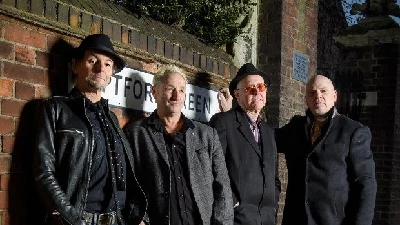
|
| Bringing together members of The Stranglers, The Damned, Ruts DC and Johnny Moped, Wingmen recently completed their debut tour showcasing their acclaimed debut album. Lead singer, guitarist and Stranglers’ frontman Baz Warne chatted to Denzil Watson about the group’s progress |
| Hugh Cornwell: Interview (2015) |
Pennyblackmusic Regular Contributors
Adrian Janes
Amanda J. Window
Andrew Twambley
Anthony Dhanendran
Benjamin Howarth
Cila Warncke
Daniel Cressey
Darren Aston
Dastardly
Dave Goodwin
Denzil Watson
Dominic B. Simpson
Eoghan Lyng
Fiona Hutchings
Harry Sherriff
Helen Tipping
Jamie Rowland
John Clarkson
Julie Cruickshank
Kimberly Bright
Lisa Torem
Maarten Schiethart